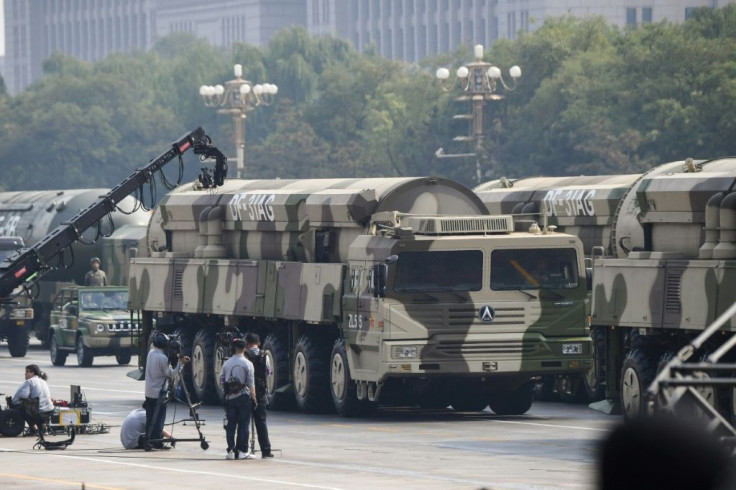Missiles, Drones And Tanks: China Shows Off Military Prowess

China put its growing military might on full display Tuesday with a parade of new ballistic missiles, supersonic drones and next-generation battlefield tanks that highlighted Beijing's accelerating race to match the firepower of its US rival.
The tightly choreographed procession across Tiananmen Square underscored a level of material and technological innovation that is increasingly viewed by many as a threat to US dominance in the Asia-Pacific region and beyond.
President Xi Jinping, who reviewed the troops before the parade marking 70 years of Communist Party rule, has pushed for the People's Liberation Army to become a "world-class" military by mid-century.
China's rapid military modernisation comes as it faces rising diplomatic tensions with the United States, with Washington worried about Beijing's territorial claims in the South China Sea and its ambitions to reunify self-governed Taiwan with the mainland.
Some 15,000 PLA soldiers marched, while 580 pieces of military hardware rolled across the square and 160 aircraft buzzed overhead as Xi and other party leaders looked on.
One of the standout new additions on display was the intercontinental ballistic missile DF-41, which can possibly carry up to 10 nuclear warheads and reach any point in the United States.
According to state news agency Xinhua, the Dongfeng-41 missiles are "the mainstay of China's strategic nuclear strength".
Another star at the parade was the ballistic missile JL-2, which can be fired from a submarine and is equipped with a nuclear charge.
Its supposed range of 8,000 kilometres (5,000 miles) would allow it to reach Alaska and parts of the western United States, according to military information company Jane's.
A new cruise missile, the DF-100, is reputed to travel beyond the speed of sound and be able to neutralise aircraft carriers.
The short-to-medium-range DF-17 missile made its public debut. It is believed to be capable of releasing a "hypersonic glider" from the edge of space, with a tough-to-predict trajectory.
For the first time, Beijing showed off its WZ-8 drone, a supersonic reconnaissance unmanned aerial vehicle that could potentially be deployed by aircraft.
Anti-terrorist assault vehicles and armoured anti-riot vehicles from the Falcon Commando Unit also rolled through the square, which Xinhua said was "mainly used to crack down on terrorism and violence" and used for "dealing with emergencies and fighting riots".
The parade also featured new-generation main battlefield 99A tanks.
Xinhua said 40 percent of the weaponry displayed at the parade was new and all the armaments were made domestically.
'Closing the gap'
Adam Ni, an expert on China's military modernisation at Macquarie University in Sydney, told AFP the parade showed a "substantial progress of China's nuclear forces".
"Its nuclear arms are increasingly more mobile, resilient, reliable, precise, and technologically advanced," he said.
"They are also more diversified: China is transitioning its nuclear force from a reliance on land-based to one that is also sea-based and air-based, using submarines and stealth bombers."
Xi said in a speech to kick off the parade that China only seeks "peaceful development" and that the two-million-strong PLA will "firmly uphold world peace".
"This display of nuclear weapons doesn't signal a change in China's nuclear strategy," said Cui Yiliang, editor-in-chief of industry magazine "Modern warships".
"It will continue to have a small but effective nuclear arsenal. The goal is to have a nuclear deterrent and be able to conduct a second strike in retaliation in case of an attack by a third country," Cui said.
In July Beijing outlined a national defence plan to build a modern, high-tech army.
China's defence spending is second only to the United States -- though it still lags far behind -- and it said earlier this year it planned to raise it by 7.5 percent in 2019, though the increase in expenditure has slowed as the economy has cooled in recent years.
In March Beijing said it would spend 1.19 trillion yuan ($177.6 billion) on defence in 2019, after it increased its outlay by 8.1 percent to 1.11 trillion yuan in 2018, according to a government report presented at the start of the annual meeting of the National People's Congress (NPC).
A report in April by the Stockholm International Peace Research Institute found China's military spending has risen 83 percent since 2009, bringing it up to second place, ahead of Saudi Arabia, India and France.
According to the report, the US figure alone of $649 billion in 2018 was as much as the next eight highest military budgets.
James Char, a military expert at Singapore's Nanyang Technological University, warned there is still some way before China is as big a military technological power as the US.
"Actual martial prowess is not as easily showcased as displaying military hardware," he said.
© Copyright AFP 2024. All rights reserved.





















